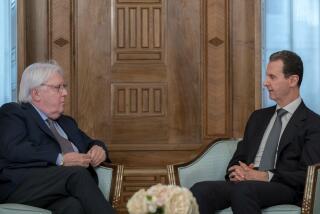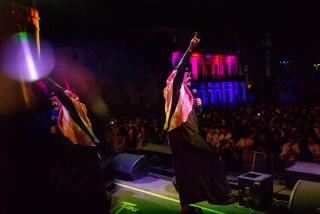President Ali Abdullah Saleh makes surprise return to Yemen
- Share via
Reporting from Cairo and Sana, Yemen — Nearly four months after he was severely wounded in an assassination attempt, President Ali Abdullah Saleh made a surprise return to Yemen on Friday in a risky attempt to assert control over a nation convulsed in protests against him and tipping toward civil war.
Saleh’s arrival was a dramatic gamble by a leader skilled at brinkmanship. But it was unclear whether he could save his presidency or calm the escalating factional fighting gripping his impoverished country. He called for negotiations and a cease-fire but offered no hint that he would step down, a demand of hundreds of thousands of protesters since January.
“The solution is not in the mouths of rifles and guns, it is in dialogue and stopping bloodshed,” the Defense Ministry quoted Saleh as saying. He was expected to address the nation Sunday.
Saleh reportedly returned to Yemen before dawn after months of recuperating in Saudi Arabia from serious burns suffered during a rocket attack on his compound in June.
His sudden reappearance in the capital, Sana, where more than 70 people died in violent clashes this week, most of them anti-Saleh protesters, inflamed passions of those for and against him. Gunfire rattled and fireworks exploded as his supporters poured into the streets waving his picture and his detractors vowed to force his resignation.
The president did not make his intentions known and it was uncertain whether his presence would dim or improve the chances for a plan to transfer power backed by Saudi Arabia and the United States.
“His return does not mean anything to us,” said Khaled Khalani, an antigovernment protester, who, like many, feared that the president’s return would spark more fighting. “We want him to leave power. I will not stop protesting until he is gone.”
Beyond Saleh’s presidential palace, Sana is a frayed and battered city that speaks to the nation’s tribal complexities and enduring turmoil. Some analysts said Saleh’s reappearance was an effort by a leader — adroit at manipulating tribes and enemies — to strike a political deal and contain the widening fighting that has exploded after months of relatively peaceful protests. But Saleh has ignored increasing international pressure to resign.
“Saleh has been in power for 33 years and those in his ruling General People’s Congress have their connections and relationships to stay in control,” said Abdul Hamid Jaraid, a political scientist. “So what we will see is a political deal between the GPC and the opposition to allow ruling party members a place in the political future. The protesters, of course, will not be happy about this.”
: The violence intensified this week when soldiers loyal to Maj. Gen. Ali Mohsin Saleh Ahmar, the commander of the 1st Armored Division who defected in March and joined the protests, battled government troops. The bloodshed further increased when followers of Hamid Ahmar, a tribal leader and telecommunications billionaire who is unrelated to the general, battled Saleh’s supporters.
Saleh’s family, including his son Ahmed, who was seen as a likely successor, control the nation’s military and intelligence services. But they have been unable to put down the rebellion or offer a political solution acceptable to the opposition. Saleh has repeatedly broken promises to step aside, and the country, which is also fighting a powerful Al Qaeda affiliate, is racked by poverty, unemployment and drought.
“The president’s homecoming means stability,” said Tawfiq Jaber, a Saleh supporter. “He will solve a lot of the problems. He’s the only one who can balance this political crisis.”
Many members of Saleh’s ruling party suspect that the June rocket attack was plotted by Hamid Ahmar, who had publicly criticized attempts by Saleh to groom his son for the presidency.
As Saleh’s supporters lined the streets Friday waving flags to celebrate his return, many other Yemenis offered him little sympathy.
“The young protesters will not accept any deals,” said Ahmed Zuhair, an antigovernment demonstrator. “This revolution will not stop until it achieves all its goals.”
Times staff writer Fleishman reported from Cairo and special correspondent Al-Aalayaa from Sana.
More to Read
Sign up for Essential California
The most important California stories and recommendations in your inbox every morning.
You may occasionally receive promotional content from the Los Angeles Times.














